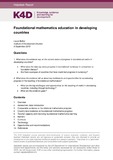Foundational Mathematics Education in Developing Countries
Abstract
There is concern that children in developing countries are not learning sufficient mathematics skills. Focus on enrolment and literacy may have led to neglect of mathematics learning and less is known about the status in this area. According to a UNESCO study in 2014 fewer than 50 per cent of grade 6 students have achieved a minimum level in mathematics in three quarters of eastern and southern African countries (UNESCO, 2014). In the remaining quarter of countries, between 56 and 62 per cent of students had learned basic mathematics skills. To obtain information on mathematics progress this report extracts data from the World Bank database. Section 2 describes the different data scales and section 3 reports results. Section 4 includes some case studies from further research into different countries. The following sections 5 to 9 discuss findings on teacher capacity, barriers, curricula, and technology. Section 10 outlines recommendations and research gaps. Factors affecting mathematics progress tend to mirror issues affecting educational attainment in general. Studies identify socio-economic factors as commonly associated with learning in mathematics. There is a consensus that making improvements in overall school quality will likely improve mathematics attainment. One problem specific to mathematics is cultural attitude. Some cultures do not value mathematics and have expectations of failure. Attitudes need to be changed within the public and education sector highlighting the benefits, accessibility and achievability of mathematics for everyone. Some evidence is found that teaching mathematics in English or French rather than local languages may impede learning. Translating shared materials into local languages may be resource intensive. Some teachers do not know the local language where they are teaching. Some case studies are found where technologies have been shown to improve mathematics results. Technologies are particularly cost-effective as they can be shared more easily but language of instruction would not be mother-tongue. Early childhood development interventions are a good place to start to improve foundational numeracy learning. Positive examples are identified in Botswana, South Africa, and Rwanda.
Citation
Bolton, L. (2019). Foundational mathematics education in developing countries. K4D Helpdesk Report 657. Brighton, UK: Institute of Development Studies.Is part of series
K4D Helpdesk Report;657Rights holder
© DFID - Crown copyright 2019Collections
- K4D [937]

